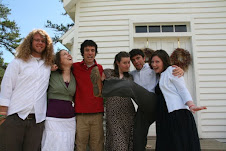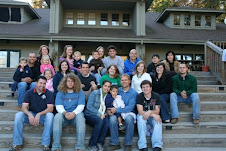The book of Job is one of my favorite books of the Bible, mostly because I can empathize with Job in his sufferings. As a result of illness I've gone through many periods when I've felt like Job and railed against God, not understanding why, being angry about what I'd lost or what I couldn't do. But more than that, the value of the book of Job in my life, the lesson and the message that has always stuck with me, is encompassed in job 1:21 "The Lord gave and the Lord has taken away; blessed be the name of the Lord!" Strange words from a man whose life has been stricken with every kind of trial known to man, but oh how true! I've been reading through Job during my holy hours lately, and realizing how much respect I have for him and the wisdom and faith it takes to utter those words and really truly mean them, which Job does.
One of the things that Job struggles with is not understanding why all this has befallen him. He knows that he hasn't sinned, that his pain is not a result of his own actions, and is steadfast in that claim. He wants God to explain Himself and tell him why. Which is a feeling that I can understand very well. But in reading Job, I've come to the realization that I really don't need to know why I'm sick. I mean, look at Job. The witness of his sufferings and his redemption have stood for centuries, for millenia, and the glory that his story has given God is beyond anything he could have imagined. When I think about that, I can only wonder what purpose He has in store for my small share of pain. And I know He has one. The fruits this illness has born already, whether through offering it up in prayer, or the clearer priorities it has given me, the patience, the gratitude for the small things, have been worth it. And that's only the things that I know about. Who knows what the All Powerful has been doing that is beyond my understanding.
And in the end, Job's story has a very happy ending. Job is restored to his former prosperity of course, but more than that he is made an intercessor for his friends, and the Lord hears his prayers because they are born out of his suffering. Its because of and through that suffering that Job becomes an intercessor for those around him, which is a very special gift and a remarkable blesisng.
So I will always choose to say Blessed be the Name of the Lord because I know that God is taking care of me, has bigger plans for me than I do for myself, just as He did for Job. This illness is not something that I can control or change, so my worrying about what I cannot do, or what others may think is quite simply a waste of time. But praising God, well, that is never a waste of time.
Friday, January 30, 2009
Saturday, January 17, 2009
St. Andrew

This afternoon some of us missionaries traveled to St. Helena's Church in Clayton for mass where Fr. Foley, a visiting priest gave one of the best homilies I've heard in a long time. The topic he chose to talk about was St. Andrew, which at first seemed strange- the first reading was about the call of Samuel and the Gospel about the call of the first disciples. St. Andrew is mentioned in but one line, so I wasn't expecting him to be the center of the homily. Which was exactly the point.
Father talked about how St. Andrew was the first of Jesus' disciples, the first to react to the call, and that it was through him that St. Peter was brought to Jesus. But though the first, Andrew was not included in the inner circle of the apostles- Peter, James, and John. He's only mentioned 12 times in the New Testament, and nine of those times he's only referred to as one of the 12. Andrew was an ordinary man who answered the call God placed on his heart, he wasn't a great man or a genius or an orator, just a man who did was he was called to do, no more, no less. And that, Father said, was what made Andrew a saint. The three times that we read about St. Andrew's actions in the New Testament he is bringing someone to Jesus. How profound.
The point of Father's homily was that we don't need to be anyone other than who we are to do God's work. St. Andrew was content to be an ordinary man, he didn't seek greatness, and we have no record of him being upset or jealous, of being unsatisfied with his place. He did the work that he was called to and he did it well- he brought people to the Lord.
As I'm still trying to figure out my place here at Covecrest and my place in the world, what I'm doing now and what I will be doing next, the example of Saint Andrew is what I need to remember to simply be me and to simply be God's. I don't need anything more.
Tuesday, January 6, 2009
The Feast of the Epiphany
Ok so I know I'm a little late, as its now two days after the feast day. But late or no I wanted to share this poem with you about the day. Its called the Journey of the Magi by T.S. Eliot, and its one of the very few poems that I actually like. I read it in high school, and it has stuck with me since then, especially the final stanza. Simple, but complex at the same time, Eliot points out to us during the Christmas season that the Incarnation and the Cruxificion are tied together.
A cold coming we had of it,
Just the worst time of the year
For a journey, and such a long journey:
The ways deep and the weather sharp,
The very dead of winter.
And the camels galled, sore-footed, refractory,
Lying down in the melting snow.
There were times when we regretted
The summer palaces on slopes, the terraces,
And the silken girls bringing sherbet.
Then the camel men cursing and grumbling
And running away, and wanting their liquor and women,
And the night-fires going out, and the lack of shelters,
And the cities dirty and the towns unfriendly
And the villages dirty and charging high prices:
A hard time we had of it.
At the end we preferred to travel all night,
Sleeping in snatches,
With the voices singing in our ears, saying
That this was all folly.
Then at dawn we came down to a temperate valley,
Wet, below the snow line, smelling of vegetation;
With a running stream and a water mill beating the darkness,
And three trees on the low sky,
And an old white horse galloped away in the meadow.
Then we came to a tavern with vine-leaves over the lintel,
Six hands at an open door dicing for pieces of silver,
And feet kicking the empty wineskins.
But there was no information, and so we continued
And arrived at evening, not a moment too soon
Finding the place; it was (you may say) satisfactory.
All this was a long time ago, I remember,
And I would do it again, but set down
This set down
This: were we led all that way for
Birth or Death? There was a Birth, certainly,
We had evidence and no doubt. I had seen birth and death,
But had thought they were different; this Birth was
Hard and bitter agony for us, like Death, our death.
We returned to our places, these Kingdoms,
But no longer at ease here, in the old dispensation,
With an alien people clutching their gods.
I should be glad of another death.
A cold coming we had of it,
Just the worst time of the year
For a journey, and such a long journey:
The ways deep and the weather sharp,
The very dead of winter.
And the camels galled, sore-footed, refractory,
Lying down in the melting snow.
There were times when we regretted
The summer palaces on slopes, the terraces,
And the silken girls bringing sherbet.
Then the camel men cursing and grumbling
And running away, and wanting their liquor and women,
And the night-fires going out, and the lack of shelters,
And the cities dirty and the towns unfriendly
And the villages dirty and charging high prices:
A hard time we had of it.
At the end we preferred to travel all night,
Sleeping in snatches,
With the voices singing in our ears, saying
That this was all folly.
Then at dawn we came down to a temperate valley,
Wet, below the snow line, smelling of vegetation;
With a running stream and a water mill beating the darkness,
And three trees on the low sky,
And an old white horse galloped away in the meadow.
Then we came to a tavern with vine-leaves over the lintel,
Six hands at an open door dicing for pieces of silver,
And feet kicking the empty wineskins.
But there was no information, and so we continued
And arrived at evening, not a moment too soon
Finding the place; it was (you may say) satisfactory.
All this was a long time ago, I remember,
And I would do it again, but set down
This set down
This: were we led all that way for
Birth or Death? There was a Birth, certainly,
We had evidence and no doubt. I had seen birth and death,
But had thought they were different; this Birth was
Hard and bitter agony for us, like Death, our death.
We returned to our places, these Kingdoms,
But no longer at ease here, in the old dispensation,
With an alien people clutching their gods.
I should be glad of another death.
Subscribe to:
Posts (Atom)

